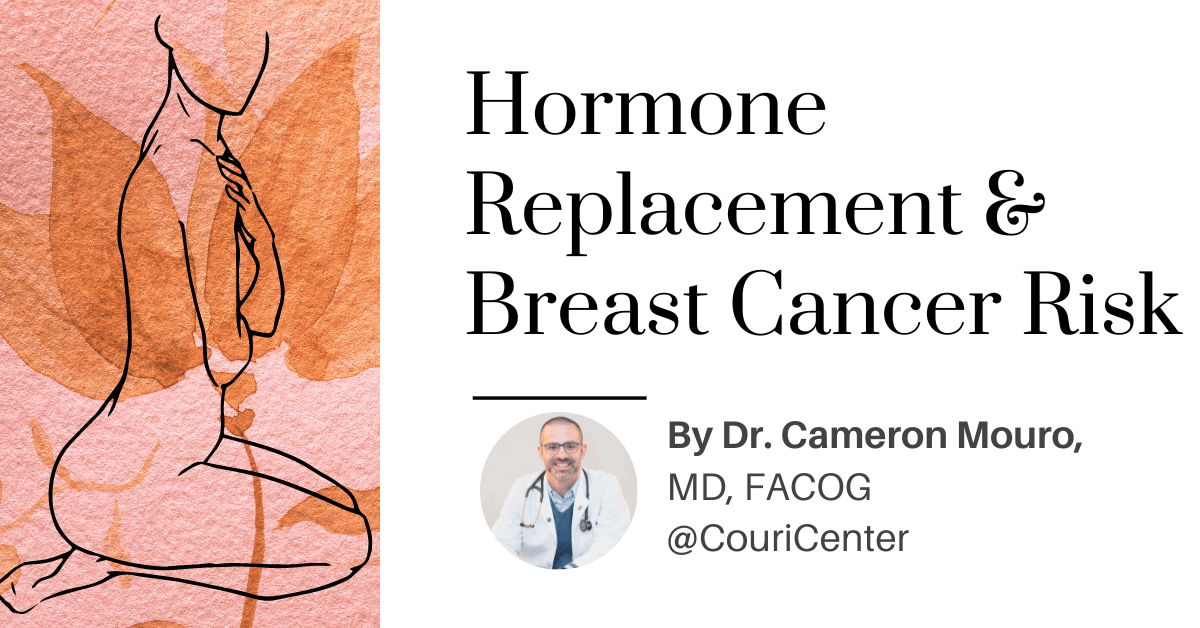
It’s Not What You May Think.
Hormone Replacement & Breast Cancer, Circa 2000
Many women ask if hormone replacement therapy (HRT) in post-menopausal women causes an increased risk of breast cancer. In the early 2000s, the answer would have been a firm yes. At that time, results from the Women’s Health Initiative study showed a greater occurrence of breast cancer in women who used HRT, specifically the combination of a synthetic estrogen (conjugated equine estrogen) and a synthetic progestin. As a result, many women at that time were understandably throwing their hormone pills in the trash, and healthcare providers refused to prescribe HRT. The end result was the needless suffering of thousands of women.
Estrogen, Alone, Does NOT Cause an Increased Risk of Cancer
Today, however, the answer to the question of HRT causing a greater risk of breast cancer is “it depends”, and the risk is definitely multifactorial. Thankfully, we didn’t take the results of that Women’s Health Initiative study for fact and instead looked more closely at the how and why of hormones and breast cancer. It turns out estrogen, the most important hormone for treating menopause symptoms, by itself, does not cause an increased risk of breast cancer. This finding has been confirmed in several research studies, including a large study1 from Canada published in June of this year. The researchers compared thousands of women with and without breast cancer and analyzed their hormone replacement use. There was no difference in breast cancer risk in women who used estrogen alone.
HRT Using Estrogen with a Natural Progesterone had NO Increase in Risk of Breast Cancer
For many women, however, using only estrogen is not an option. If they still have their uterus (have not had a hysterectomy), the addition of progesterone to their HRT is required. Progesterone prevents the negative effects estrogen can have on the uterine lining. There are different types of progesterone – synthetic progestins and natural progesterone. The study1 out of Canada found that it was actually the oral synthetic progestins in the HRT that caused an increased risk of breast cancer. Women who used an HRT regimen of estrogen with natural progesterone (micronized progesterone) had no increase in the risk of breast cancer. Rest assured that natural progesterone (micronized progesterone) is the preferred form of progesterone that we prescribe at the Couri Center.
Hormone Replacement Therapy – The Safe & Natural Way
The loss of estrogen, which is the hallmark of menopause, can lead to significant changes and symptoms for women, including hot flashes, night sweats, bone loss, and vaginal dryness. These changes can be quite debilitating and cause a poor quality of life. The use of estrogen in HRT, however, is very effective at relieving these symptoms and preventing the negative changes of menopause. Contrary to what was believed a couple of decades ago about HRT, there are safe options. When natural forms of estrogen and progesterone are used, specifically bio-identical estradiol and micronized progesterone, the suffering of menopause can be alleviated without women having to accept an increased risk of breast cancer.
We’re here to help! If you are experiencing symptoms of menopause, or want to evaluate hormone replacement options, call 309-692-6838 or schedule online. We also offer testosterone replacement pellet therapy for men. New patients are welcome.
Cameron Mouro, MD, FACOG
Resources
- Menopausal Hormone Therapy Formulation and Breast Cancer Risk. Obstetrics and Gynecology, June 2022; Vol 139, issue 6, pgs 1103-1110.
